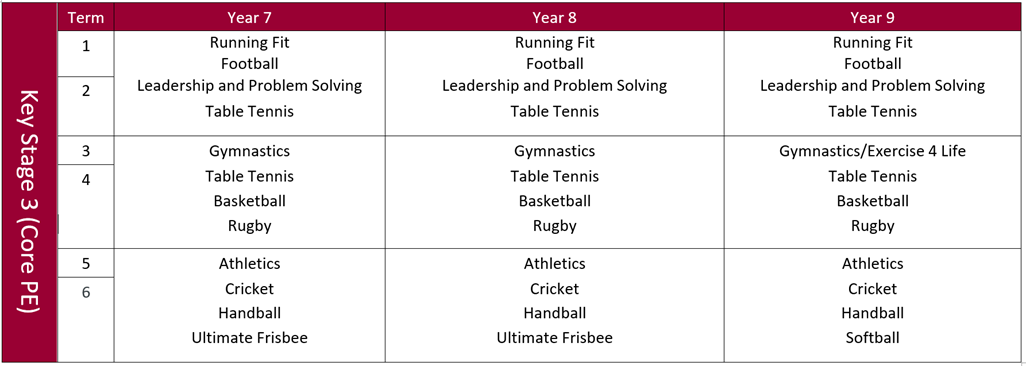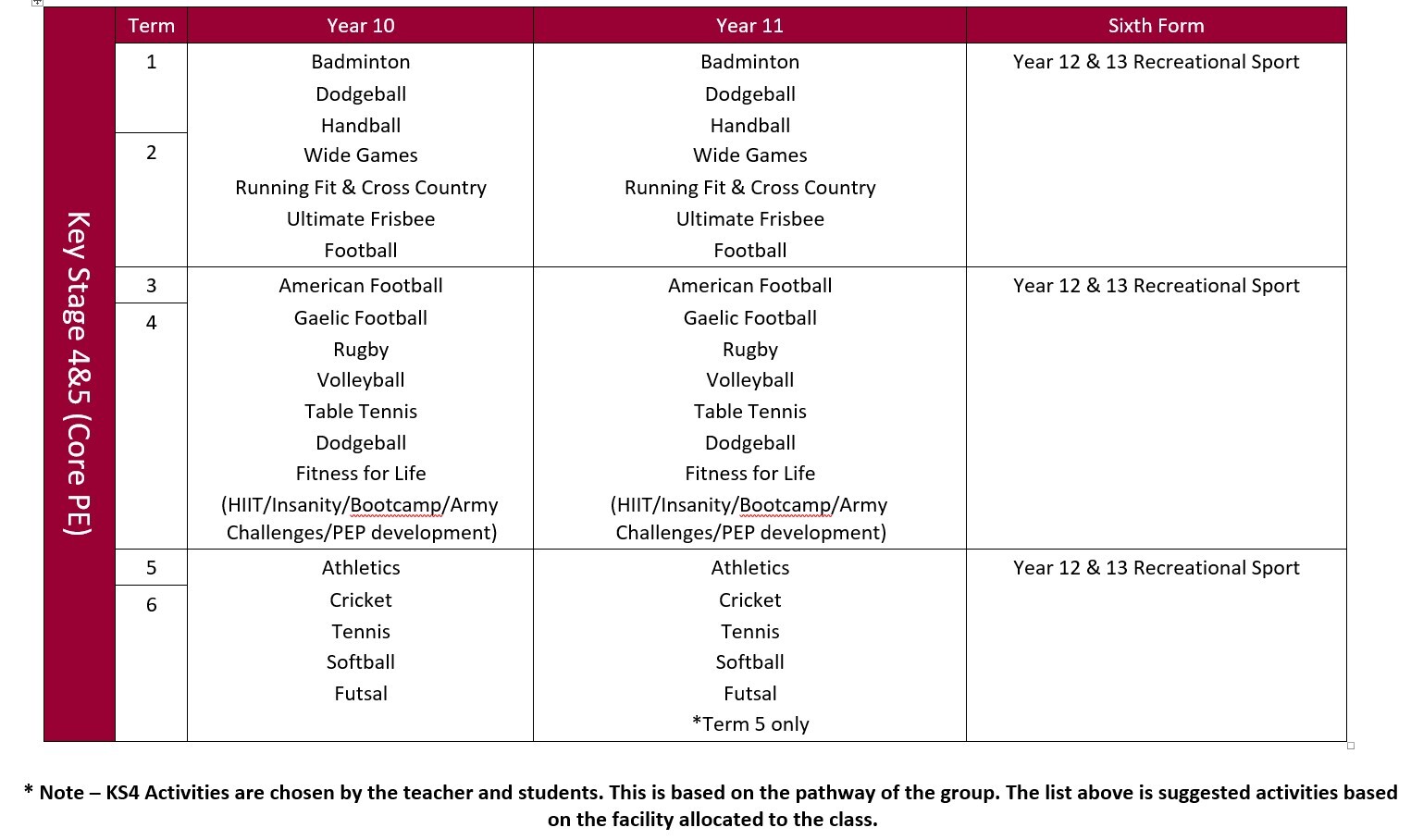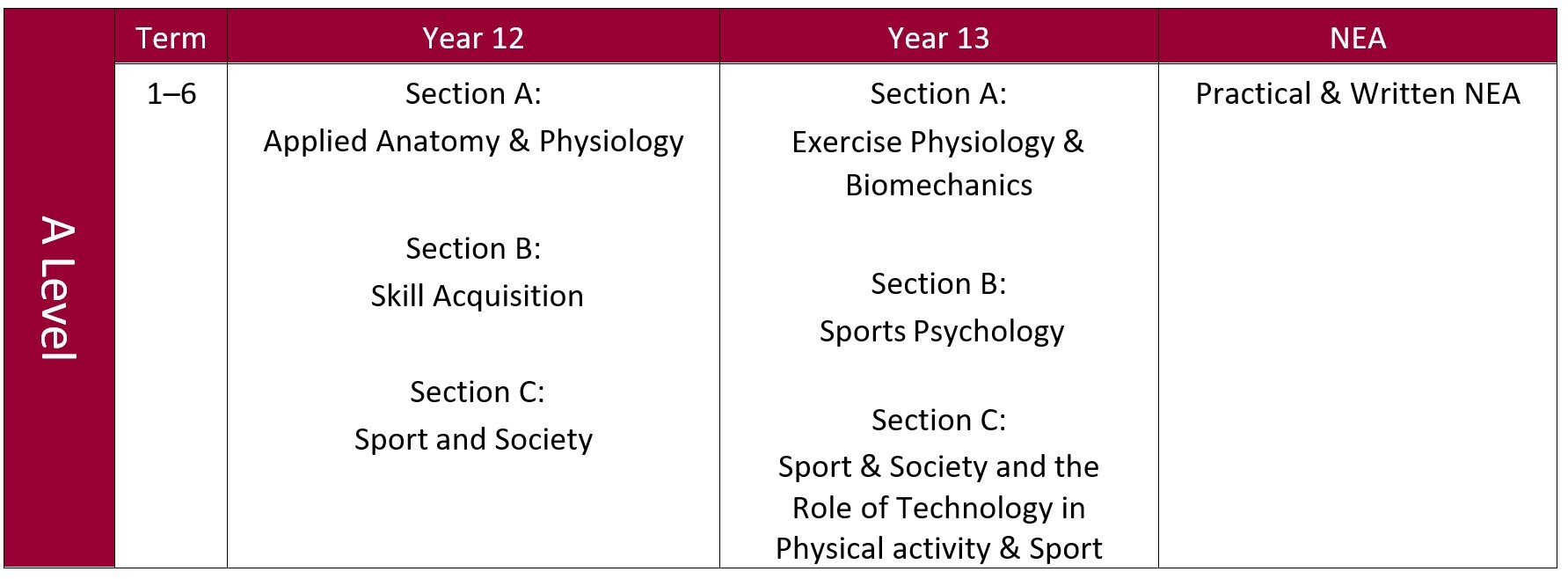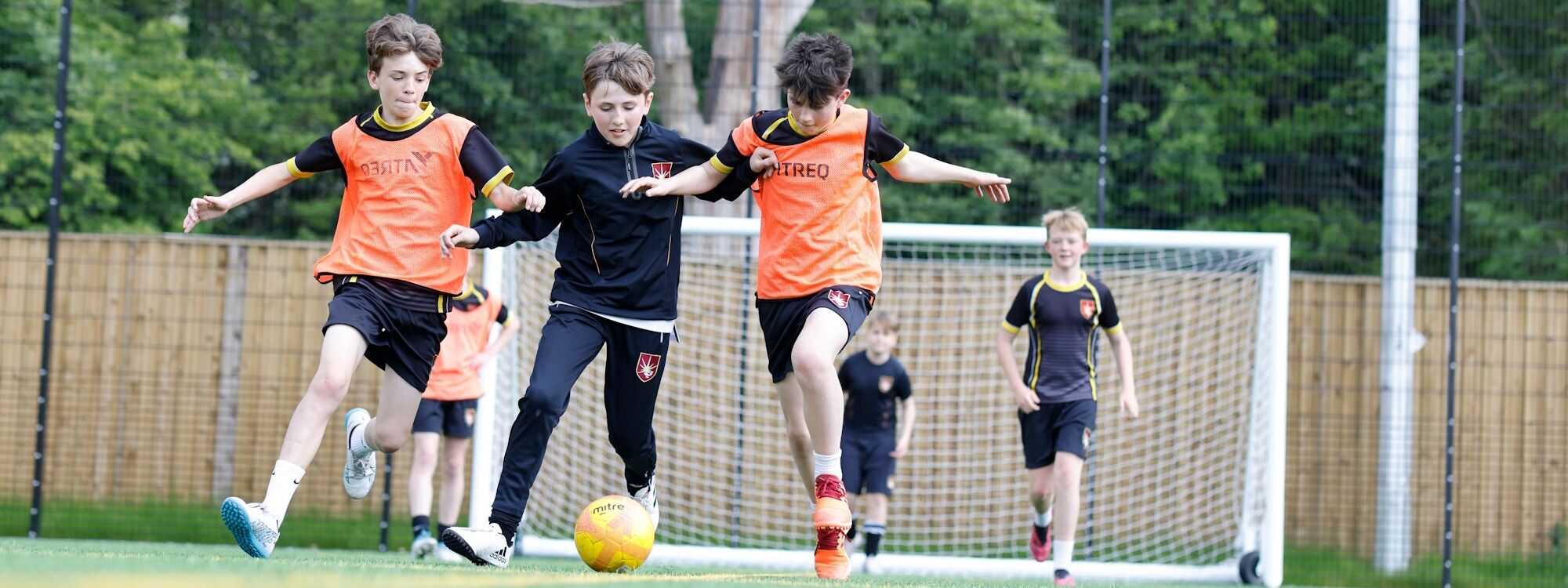- Home
- Curriculum and Exams
- Subjects
- Physical Education
Physical Education
BackHead of Department: Mr G Woods
Teachers: Mr T Boddy, Miss E Burdett, Mr C Hart, Mr A Lewis, Mr D Menzies, Mr D Millar, Mr C Scott
Our Physical Education ethos is 'sport for all'. Our curriculum offers a wide breadth of study with classes studying 12 units over the academic year. High-quality lessons ensure all students make good progress, developing performance, knowledge and character. Sports leadership themes in each unit further develop the student's ability to work independently and effectively as part of a team. The curriculum also feeds into the inter-house programme, giving the students the opportunity to be involved in competition within their year group in a wide variety of sports. GCSE and A Level Physical Education are both offered in KS4 and KS5 respectively, with students gaining excellent results in these exam courses, and many of our students going on to university to study PE and sports-based degrees.
Furthermore, the PE Department has a history of success in both team and individual sport. Our football teams regularly enjoy success in county and national competitions, with recent Kent Cup wins and a national U13B win. Our rugby teams have a number of recent wins in the Kent Shield for both U14 and U15 age groups. We are the cross-country elite national champions, Kent champions for table tennis and Kent finalists in tennis.
Although achieving regular success in team and individual sports is very important to the PE Department, our ethos is very much about maximising the involvement of all pupils in co-curricular activities with our practices open to all students. [Updated 2023/24]
Years 7, 8 and 9
 Pupils in Key Stage 3 follow a broad balanced curriculum, and have four (Year 9), or five (Years 7 and 8) single PE lessons over the two-week timetable. Throughout the year all students will participate in sports leadership, gymnastics, basketball, table tennis, football, badminton, athletics, cricket, handball, cross-country and rugby among other sports.
Pupils in Key Stage 3 follow a broad balanced curriculum, and have four (Year 9), or five (Years 7 and 8) single PE lessons over the two-week timetable. Throughout the year all students will participate in sports leadership, gymnastics, basketball, table tennis, football, badminton, athletics, cricket, handball, cross-country and rugby among other sports.
Core PE: Years 10-13
 Year 10 students have four lessons of core PE in a two-week cycle, Year 11 students have three.
Year 10 students have four lessons of core PE in a two-week cycle, Year 11 students have three.
Classes are grouped into pathways: performance and competition, sport and recreation, and sport fitness and health.
Throughout the year all students may participate in basketball, football, athletics, tennis, cricket, softball, volleyball, Ultimate Frisbee, futsal, handball, cross-country and rugby among other sports.
GCSE: Years 10 and 11

Year 10 curriculum outline
| TERM | Topics covered in theory lessons | Practical activity | Method(s) of assessment |
| 1 | Applied Anatomy and Physiology:
| Football
| Theory topics are internally assessed. Practical activities are internally assessed in skills/ practices and game situations |
| 2 | Movement Analysis / Levers
| Football Badminton |
|
| 3 | Physical Training
| Rugby
Basketball
Badminton |
|
| 4 | Use of Data in Sport
| Rugby Basketball | Year 10 Mock Theory Exam |
| 5 | Sports Psychology
| Athletics
Tennis |
|
| 6 | Socio-cultural influences
Analysis and evaluation task introduced | Athletics Tennis Cricket |
|
Year 11 curriculum outline
| TERM | Topics covered in theory lessons | Practical activity | Method(s) of assessment |
| 1 | Socio-cultural influences
Analysis and evaluation task | Football
| Theory topics are internally assessed. Practical activities are internally assessed in skills/ practices and game situations |
| 2 | Use of Data in Sport
Analysis and evaluation task | Football
Badminton | Year 11 Mock Theory Exam |
| 3 | Health and fitness
Analysis and evaluation task | Rugby
Basketball
Badminton |
|
| 4 | Revision
|
|
|
| 5 | Revision
|
| Year 11 GCSE PE Practical Moderation |
Exam board: AQA
A Level: Years 12 and 13
Course content
The course enables the student to develop an understanding of physiological, psychological and social/cultural aspects which affect skilled performance and participation in physical education and sport. Students also learn to observe and analyse practical performance, as well as refine their own skills. Students gain the opportunity to take up leadership roles, as a coach or choreographer. The varied course requires an interest in contemporary issues in sport, sound research skills and considerable independent learning.

|
Course outline |
|
Examination: Paper 1 (35%)
|
|
Examination: Paper 2 (35%)
|
|
Non-Examination (30%) Practical performance in physical activity and sport. Students are assessed as a performer or coach in the full-sided version of one activity (written/verbal analysis of performance). |
Exam board: AQA
Careers Education
Physical Education provides opportunities for several career paths in sport, including Sport Science, Sports Leisure and Management, Physiotherapy, Podiatry, Teaching and Coaching courses at university to name but a few.
In Year 11 GCSE theory syllabus, there is a section on Careers in PE including physiotherapy, sports medicine, sports massage, coaching, sports journalism, teaching, sports scientist, performance analysis, sports psychologist, sports nutrition.
We also give specialist advice for those students looking to follow sports-related degree courses and offer coaching opportunities for students in Years 10–13 in football, rugby, basketball and athletics.
